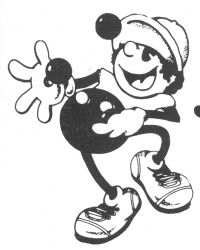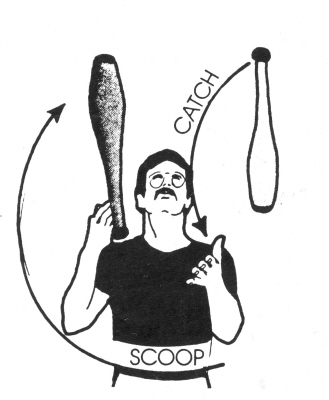 |
Joggler's Jottings by Bill Giduz IJA President
|
Page 24 Winter 1986 - 87
 |
Joggler's Jottings by Bill Giduz IJA President
|
|
The
Professor Dedicates 'Complete' Juggling Book to IJA by
Bill Giduz, IJA President
The
experience of ten years teaching an estimated 300,000 people to juggle
has been processed through the heart and sweat glands of Dave Finnigan
(aka Professor Confidence) into "The Complete Juggler."
There's never been a juggling publications event like it.
The
Vintage branch of Random House selected "The Complete
Juggler" as its seasonal feature and is to unveil it with mall
events and a publicity tour by the author during February. Vintage
took on the project readily. It was they who published Carlo's
"Juggling Book" in 1974, and they witnessed the tremendous
success of Klutz Press's "Juggling for the Complete Klutz."
"We
did very well on Carlo's book, and think this one is even
better," said Ann Freedgood, Vintage executive editor.
"The
Complete Juggler" deserves the hoopla. There's never been a
juggling book so voluminous (more than 600 pages), more economical
Gust $9.95), or more heavily illustrated (thousands of howto
drawings).
Since
the day ten years ago Finnigan left his former employment and first
called himself a juggler, he has strived to give juggling to the
masses. His company, "Jugglebug," was the first to feature
equipment for beginners and broad availability nationwide. He began
"The Juggling Institute" to teach school-age children in a
systematic manner. Publication of "The Complete Juggler" is
the capstone of his accomplishments.
Finnigan
spent a full-time year working with artist Bruce Edwards and a layout
assistant to construct this mammoth book. "The Complete
Juggler" tackles the subject from every conceivable angle. Its
strength is more than 400 pages of illustrations on learning tricks.
The chapters cover balls, rings, clubs, cigar boxes, devil sticks,
diabolos, hats, plates, spinning and auxiliary equipment. Each page is
lively with pictures and light on copy, inviting readers to keep
turning them. Realistic renditions of Finnigan and his friends are
Lest
you think it's only a book for beginners, hear ye that most difficult
material is covered as well. Yes, you can learn three scarves here
(they're packed in the flyleaf), but the Professor will also teach you
a seven-ball multiplex and devil stick moves with two hands
simultaneously.
The
book guides you through the steps leading up to the difficult tricks.
Finnigan said, "It takes you through the intermediate level with
illustrations. If you want to be a polished performer you have to go
beyond that, and no book can help there. The art becomes too
idiosyncratic. "
That
book also proposes a certification level system for those inclined to
take tests and receive badges. Requirements for winning a badge appear
at the beginning of each chapter. If you can learn the required tricks
and have an official attest to that fact (IJA affiliates count as
officials), you can buy the badge for a nominal fee. Jugglebug is
betting that the system won't be abused because badge holders will
fear friends may ask them to demonstrate the tricks they've learned!
An
additional 150 pages of text includes a list of sources for more
information, performance tips and 23 novelty routines in the public
domain. The latter is balanced with a statement on plagiarism
emphasizing the dishonor of outright stealing of material.
There
are outlines of how to do school assemblies (and how to creatively
control screaming kids!) ,and juggling games.
Passing
on what he has learned to do best,
Finnigan includes an extensive section
on how to teach others to juggle. Beginning with one scarf for
youngsters, two dozen lesson plans for students from elementary level
to secondary school are revealed. Each begins with the objective of
the lesson, equipment needed and steps in the lesson.
Want
to make money with your juggling? The book tells you how, including
the warning, "You must be willing to invest two or three years of
hard work before you begin
to see success. Don't quit that day job
yet." Included in that chapter are tips on promotion, publicity
kits, developing a persona, contracts and the various markets you
might consider.
Ten
years ago Finnigan quit his former employ and became a juggler in
order to "spread the joy" he found in the activity. The
penultimate chapter of the book is about
"spreading the joy." He wants us to challenge others
to learn, to start a club, to hold a festival, and gives the reader
information to assist those endeavors.
The book concludes with an inventive visit to an imaginary IJA convention. The author brings contemporary jugglers into the spotlight, then probes the historical roots of their specialties. The section gives a good overview of the modern juggling repertoire along with a brief history of the art. Who's
it for? Finnigan has never been accused of thinking small.
I
believe the book's publication represents a landmark in the
contemporary history of juggling. Its affordability and availability
will give far-flung jugglers a common bond. Jugglebug is betting that
the system of certification pins will also capture the imagination of
young jugglers.
It
will generate a surge of interest and participation in the juggling
by the general public.
At
best, enough critical mass could be generated to interest arts
patrons, foundations, corporations and the media to support juggling
as wholeheartedly as other fine arts. That remains to be seen. But one
thing's for certain. It's as good I! springboard toward that
popularity as juggling has ever been offered!
I also want to use this space to offer public apology to an old friend of the IJA who was offended by my comments in this space in the last issue. The politics of professional juggling these days can only be fully realized by those, like him, who live them daily.
The IJA's effect on juggling as popular recreation and as media phenomenon might be growing, but the top realm of the profession feels our impact very little. In my post-convention zeal I overstepped my editorial privilege, and the juggler in question let me know of it in no uncertain terms! Here's saying "Sorry, friend." I never intended that kind of harm. |
 |